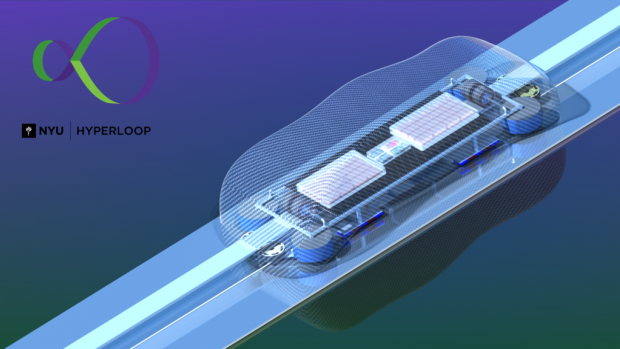The Heat is on for NYU Hyperloop
The Team Was Selected to Compete in the 2019 Competition

Since the inception of the Hyperloop competition, NYU has fielded a team, and each year their pod gets increasingly sophisticated, efficient, and competitive. This year the NYU Hyperloop team, headed by senior Mathieu Loing, a mechanical engineer, has a record 34 students from various years majors, including electrical engineering, mechanical engineering, civil engineering, and computer science, all working to create a new iteration of their pod to race in Hawthorne in mid-2019.
In 2015 officials at SpaceX announced that they were recruiting university teams from around the world to help them revolutionize transportation with the Hyperloop, a system of low-pressure tubes elevated high above the ground, through which pods would travel at more than 700 miles an hour. The teams were charged with designing and prototyping the pods, which would then race on a one-mile test track erected near SpaceX headquarters in Hawthorne, California.
NYU Hyperloop is now part of the Vertically Integrated Projects (VIP) program, which allows members to remain on the team throughout almost their entire academic careers, thereby building upon their knowledge and taking positions of increasing responsibility. Members have signed on to focus on various subsystems, such as propulsion (a vital area since SpaceX requires the pods to be self-propelled), lateral stability, and levitation (because the pods travel with no drag force thanks to magnetic suspension.) “We’re somewhat unusual in being comprised solely of undergraduates, as most Hyperloop teams include graduate students” Loing explains.
The group recently submitted its initial plans to SpaceX judges and were chosen as one of only 52 international teams to be invited to the next round of the competition. (Although SpaceX has not publicly revealed the size of the field, it was said to be an especially crowded one this year, and the competition has been known to draw upwards of 1,000 entrants.)
It will undoubtedly be a busy few months for the team, and the entire NYU community will be cheering them on as they progress in the competition.
It’s an exercise that could one day have a direct effect on us as commuters. This year NYU Hyperloop includes a New York City case implementation subgroup, whose job it will be to determine if a similar system might be viable here in the city. Loing says, “It could be that one day you’ll be able to get from Central Park to Boston in well under an hour for the price of a few MetroCard swipes.”

